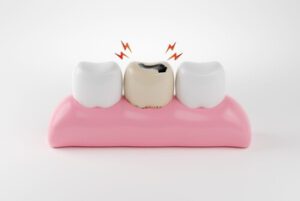
- Harris Dental Boutique
- fluoride treatment, fluoride varnish
- Dental Health
The idea of fluoride treatment often raises questions, especially for those who already follow a good oral care routine. While many use fluoridated toothpaste, others wonder if professional fluoride treatments offer any additional value. So, is fluoride treatment necessary? The answer depends on several factors, including diet, age, oral health history, and risk of decay. Understanding when treatment is necessary helps prevent long-term issues. This guide looks closely at why fluoride remains relevant for protecting your teeth.
Who Benefits Most From Fluoride Treatment?
Knowing whether fluoride treatment is necessary starts with understanding personal risk levels. Some groups benefit more than others based on specific oral conditions.
Why High-Risk Patients May Require More Support
People who frequently get cavities or show signs of early tooth decay are often recommended professional fluoride treatment. These include children, people with dry mouth, and those with orthodontic brackets that trap plaque. Even adults taking certain medications can fall into the high-risk category. When fluoride is used correctly, it strengthens tooth structure and helps treat tooth decay early.
 How Orthodontic Brackets Increase Risk
How Orthodontic Brackets Increase Risk
Orthodontic brackets make brushing teeth more difficult and allow food to lodge around wires and metal. This increases the chance of acid attacks, which wear away enamel. Fluoride helps form a shield on teeth, resisting these daily challenges. Professional fluoride treatments during orthodontic care are often a smart preventive step.
The Role of Gum Tissue in Risk Management
Receding gums expose more of the tooth’s surface and can create pockets where bacteria grow. In such cases, fluoride can reduce sensitivity and slow the progression of root decay. Maintaining strong enamel is key to avoiding deep damage in vulnerable areas. People with gum disease may find fluoride benefits even more critical.
What Fluoride Actually Does: Going Beyond Toothpaste
The role of fluoride goes far beyond what regular brushing offers. Understanding its action helps clarify why additional fluoride may be advised.
Fluoride Is a Mineral That Reinforces Enamel
Fluoride is a mineral that binds to tooth enamel, making it more resistant to breakdown. It supports the remineralisation process, especially after exposure to sugars or acids. This added layer of protection limits enamel erosion. Regular contact with fluoride keeps teeth better protected over time.
How Fluoride Varnishes Are Applied
Fluoride varnishes are a type of concentrated gel or coating applied directly to the teeth during a dental visit. The high fluoride concentration allows it to stay on teeth longer and offer targeted protection. These treatments are quick, comfortable, and ideal for both adults and children. Varnishes are a common form of professional fluoride treatment.
Fluoride Mouth Rinses vs. In-Clinic Treatment
Fluoride mouth rinses are available for daily use, especially for those at higher risk of dental caries. However, they do not match the fluoride levels of a professional fluoride treatment. Mouth rinses help maintain protection between appointments but do not replace in-clinic care. Your dentist will guide you on the right balance for your needs.
Is Your Current Fluoride Intake Enough?
The decision to add treatment depends on how much fluoride you already receive through diet and dental care habits.
Understanding Your Fluoride Intake
Fluoride enters the body through tap water, fluoridated toothpaste, and some foods. Measuring your daily fluoride intake can help assess whether you need additional support. Too much fluoride can be harmful, so balance is crucial. Your dentist can evaluate your current levels of fluoride and recommend next steps accordingly.
 Dietary Fluoride Sources to Consider
Dietary Fluoride Sources to Consider
Some foods, like tea and spinach, naturally contain fluoride, though amounts vary. Fluoride concentration in food is usually low compared to other sources, but still worth noting. Breast milk has minimal fluoride, so infants may require additional support based on their environment. For growing children, fluoride supports bone homeostasis and healthy tooth development. Bone homeostasis is the process by which the body maintains a healthy balance between bone formation and bone breakdown.
What Affects Levels of Fluoride in Water
The fluoride concentration in drinking water differs by region. Water fluoridation is a public health strategy that adjusts these levels to prevent decay. In places without added fluoride, supplements may be advised. Always ask your dentist if the fluoride in your water is sufficient to protect your dental health.
Myths About Fluoride: What Science Actually Shows
Fluoride has been surrounded by controversy, but the evidence paints a clearer picture.
Too Much Fluoride and the Risk of Overexposure
While rare, overexposure to fluoride can lead to dental fluorosis, especially in children. This condition causes visible changes in enamel but is mostly cosmetic. Avoiding excess fluoride from multiple sources, such as dietary supplements or mouth rinses, helps prevent this. Monitoring the amount of fluoride used at home is essential.
Fluoride Supplements Should Be Used Carefully
Fluoride supplements are sometimes recommended when fluoridated water is not available. However, they should never be taken without a dentist’s advice. Supplements contribute to your overall fluoride intake, and unnecessary use can lead to imbalances. They’re generally only prescribed after assessing other sources of exposure.
The Difference Between Sodium Fluoride and Other Types
Sodium fluoride is the most common form used in toothpaste and professional treatments. It has a long track record for helping prevent dental caries and strengthening enamel. Other compounds like stannous fluoride exist but work slightly differently. Sodium fluoride remains the most widely used and studied form in dental care.
When Is a Professional Treatment the Right Choice?
Some situations require more targeted care than daily routines can offer. Knowing when to take the next step is key.
What Professional Fluoride Treatments Offer
Professional fluoride treatments deliver high concentrations directly to the teeth in a controlled setting. These treatments offer protection not achievable through home products alone. The process typically takes just a few minutes and provides long-lasting defence. It’s especially valuable for those with early tooth decay or recurring cavities.
Controlling Dental Caries Before They Escalate
If you’ve had multiple fillings or are prone to decay, fluoride can help control dental caries before more serious intervention is required. It strengthens weak spots and supports natural enamel repair. Treatment frequency depends on your risk level and overall dental health. Many patients benefit from two to four fluoride treatments annually.
Tailoring Dental Care to Individual Needs
No two patients are the same, which is why dental care should be personalised. Your dentist will assess dietary fluoride, brushing habits, and oral hygiene routines to decide if added fluoride is appropriate. Factors like dry mouth or previous decay history are also taken into account. A tailored approach delivers better, more lasting outcomes.
 Is Fluoride Treatment Necessary for Everyone?
Is Fluoride Treatment Necessary for Everyone?
The short answer is no, but for many, it’s an important safeguard. The necessity of fluoride treatment depends entirely on your health, habits, and environment. Some people get adequate protection from fluoridated toothpaste and tap water alone. Others, especially those with early signs of decay, high cavity rates, or dietary limitations, may require more help. Whether you need fluoride mouth rinses, varnishes, or fluoride supplements, the right plan can help maintain your dental health long-term.
Strengthen and Protect Your Smile With Targeted Fluoride Support
Choosing whether to pursue fluoride treatment is not a one-size-fits-all decision. It depends on your risk factors, environment, and lifestyle. For many, fluoride treatments provide a simple yet powerful way to prevent further decay and reinforce tooth enamel. If you’ve experienced early decay, dry mouth, or gum issues, now is the time to act. Book an appointment to review your needs and take the next step in proactive dental care. Call us today on 07 4158 5813 to schedule your consultation and protect your smile with expert fluoride support.
References
https://www.healthline.com/health/dental-and-oral-health/fluoride-treatment
https://www.medicalnewstoday.com/articles/327168



 How Orthodontic Brackets Increase Risk
How Orthodontic Brackets Increase Risk Dietary Fluoride Sources to Consider
Dietary Fluoride Sources to Consider Is Fluoride Treatment Necessary for Everyone?
Is Fluoride Treatment Necessary for Everyone?

